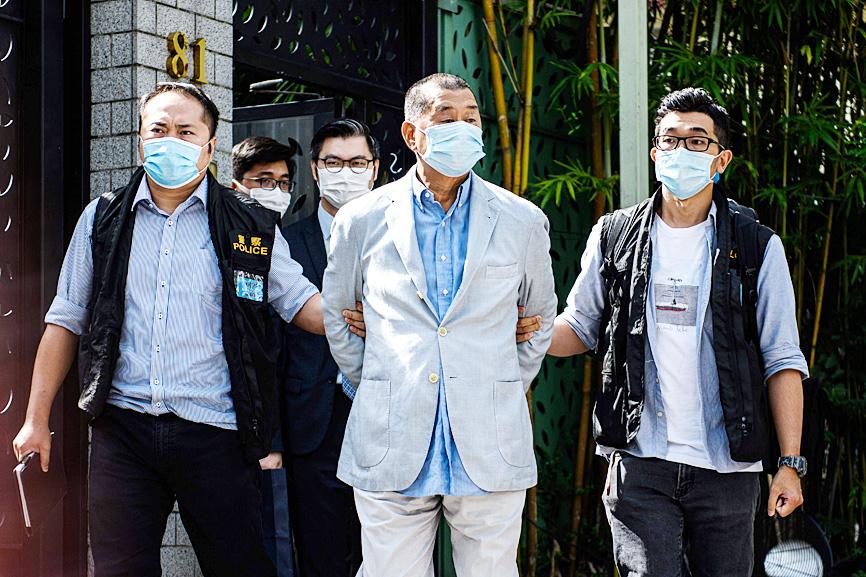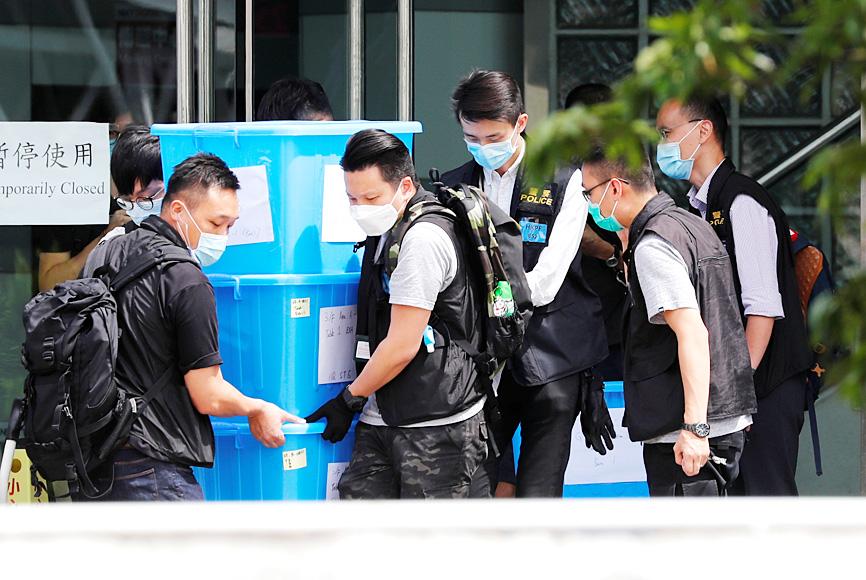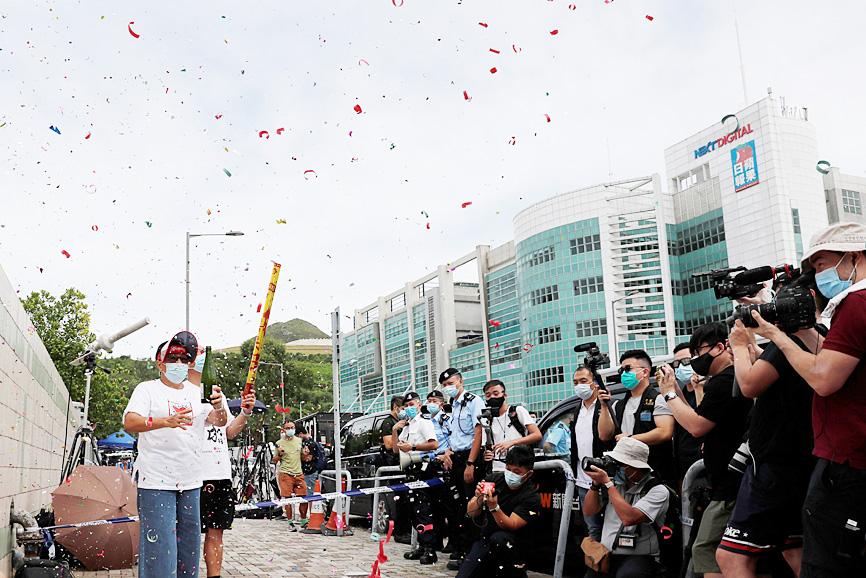Hong Kong authorities yesterday broadened their enforcement of a new National Security Law, arresting tycoon Jimmy Lai (黎智英), searching the headquarters of his Next Digital (壹傳媒) group and carting away boxes of what they said was evidence.
The police action marked the first time the law was used against news media, stoking fears that authorities are suppressing press freedom.
Next Digital operates the Chinese-language Apple Daily, which last year frequently urged readers to take part in the anti-government protests.

Photo: AFP
Hong Kong police arrested Lai, 71, yesterday morning, an aide to the businessman said, in the highest-profile detention under the new law since it took effect on June 30.
Mark Simon, a Next Digital executive and Lai’s aide, said Lai was charged with collusion with foreign powers.
He said police searched the homes of Lai and two of his sons and detained four other members of the media company.

Photo: Reuters
Hong Kong police said they arrested at nine men and one woman between the ages of 23 and 72 on suspicion of violating the new security legislation, with offenses including collusion with a foreign country and conspiracy to defraud.
They did not release the names of those arrested or provide further details of the charges.
However, the pro-democracy Stand News Web site reported that Lai’s eldest son, Lai Kin-yan (黎見恩), was wanted for conspiracy to defraud, while his second son, Lai Yiu-yan (黎耀恩), was wanted for colluding with foreign countries or foreign forces to endanger national security.

Photo: Reuters
Following Jimmy Lai’s arrest, about 200 police raided Next Digital’s headquarters, cordoning off the area, searching desks and at times getting into heated exchanges with staff.
What police were looking for in the building was not clear, although they later said they took away 25 boxes of evidence for processing.
Jimmy Lai, who was arrested at his mansion in Kowloon, was also brought to Next Digital’s headquarters, where he remained for about two-and-a-half hours before police took him away in a car.
“We are completely shocked by what’s happening now, with the arrest and followed by the ongoing raid inside the headquarters of Next Digital,” Hong Kong Journalists Association chairman Chris Yeung (楊健興) said.
“With the passage of the National Security Law and the really tough powers given to the police in their operations, we have seen now what we call ‘white terror’ become a reality, which will affect media organizations and journalists’ reporting,” Yeung said.
Police unblocked Next Digital’s offices at mid-afternoon, with police Senior Superintendent Steve Li Kwai-wah (李桂華) saying that staff were free to resume their work.
The share price of Next Digital soared more than 200 percent in the afternoon, following posts on a popular online forum encouraging investors to support the company by buying its stock.
Additional reporting by staff writer

The Central Election Commission has amended election and recall regulations to require elected office candidates to provide proof that they have no Chinese citizenship, a Cabinet report said. The commission on Oct. 29 last year revised the Measures for the Permission of Family-based Residence, Long-term Residence and Settlement of People from the Mainland Area in the Taiwan Area (大陸地區人民在台灣地區依親居留長期居留或定居許可辦法), the Executive Yuan said in a report it submitted to the legislature for review. The revision requires Chinese citizens applying for permanent residency to submit notarial documents showing that they have lost their Chinese household record and have renounced — or have never

A magnitude 5.6 earthquake struck off the coast of Yilan County at 12:37pm today, with clear shaking felt across much of northern Taiwan. There were no immediate reports of damage. The epicenter of the quake was 16.9km east-southeast of Yilan County Hall offshore at a depth of 66.8km, Central Weather Administration (CWA) data showed. The maximum intensity registered at a 4 in Yilan County’s Nanao Township (南澳) on Taiwan’s seven-tier scale. Other parts of Yilan, as well as certain areas of Hualien County, Taipei, New Taipei City, Taoyuan, Hsinchu County, Taichung and Miaoli County, recorded intensities of 3. Residents of Yilan County and Taipei received

Taiwan has secured another breakthrough in fruit exports, with jujubes, dragon fruit and lychees approved for shipment to the EU, the Ministry of Agriculture said yesterday. The Animal and Plant Health Inspection Agency on Thursday received formal notification of the approval from the EU, the ministry said, adding that the decision was expected to expand Taiwanese fruit producers’ access to high-end European markets. Taiwan exported 126 tonnes of lychees last year, valued at US$1.48 million, with Japan accounting for 102 tonnes. Other export destinations included New Zealand, Hong Kong, the US and Australia, ministry data showed. Jujube exports totaled 103 tonnes, valued at

BIG SPENDERS: Foreign investors bought the most Taiwan equities since 2005, signaling confidence that an AI boom would continue to benefit chipmakers Taiwan Semiconductor Manufacturing Co’s (TSMC, 台積電) market capitalization swelled to US$2 trillion for the first time following a 4.25 percent rally in its American depositary receipts (ADR) overnight, putting the world’s biggest contract chipmaker sixth on the list of the world’s biggest companies by market capitalization, just behind Amazon.com Inc. The site CompaniesMarketcap.com ranked TSMC ahead of Saudi Aramco and Meta Platforms Inc. The Taiwanese company’s ADRs on Tuesday surged to US$385.75 on the New York Stock Exchange, as strong demand for artificial intelligence (AI) applications led to chip supply constraints and boost revenue growth to record-breaking levels. Each TSMC ADR represents